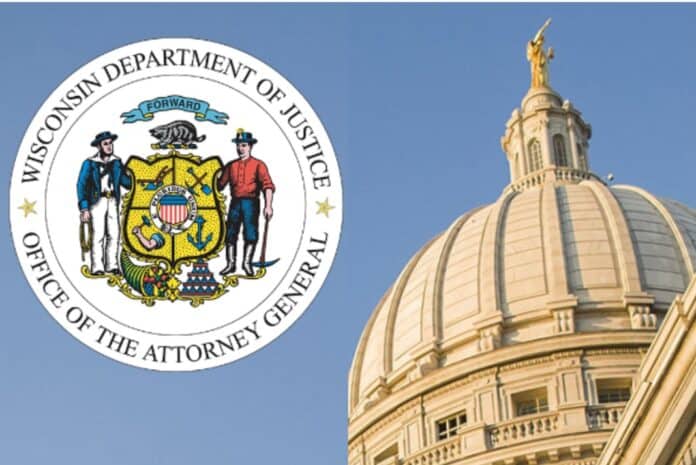The DOJ’s mismanagement imperiled crime victim grants for months, records show.
Attorney General Josh Kaul’s office so badly mismanaged an audit response involving his Office of Crime Victim Services that the Wisconsin Department of Justice was labeled a “high risk” state for federal grants, imperiling funding for domestic violence, sexual assault, and other victims throughout Wisconsin for months, Wisconsin Right Now has uncovered through a long-delayed open records request.
On May 20, 2021, the feds formally designated Wisconsin’s DOJ a high-risk grantee after Kaul’s office failed repeatedly to comply with federal requests to document questionable costs charged by local organizations, the records obtained by WRN show.
We first filed the open records request with Kaul’s office in May 2022, months before the Attorney General’s election, after getting a tip that the high-risk state label, which no one has reported until now, was imperiling important public safety grants. Even though Kaul’s office is supposed to be the state’s top enforcer of open records laws, we did not get a response for almost 1.5 years, until October 2023. That prevented Wisconsin voters from learning about Kaul’s mismanagement of a major federal audit response before the election.
It’s a pattern. The crime victim services audit issues at the Office of Crime Victim Services come after a state crime lab backlog and a backlog of Internet tips about child sexual abuse.
The high-risk state designation was not inconsequential; it imperiled funding to help crime victims throughout the state. “Until the high-risk designation is removed, new awards from the DOJ to WI DOJ will contain special conditions that provide additional oversight, as necessary. Some of these high-risk special conditions may restrict WI DOJ from obligating, expending, or drawing down funds under the new DOJ awards,” a letter from the feds to Kaul’s office said.
The awards refer to federal grants that Kaul’s office gives to community and government agencies that help domestic violence, sexual assault, and other victims throughout the state.
“The purpose of this letter is to notify you that the U.S. Department of Justice (DOJ) has designated the Wisconsin Department of Justice (WI DOJ) as a high-risk grantee, pursuant to the requirements of 2 C.F.R. § 200.207,” reads a May 2021 letter from the U.S. Department of Justice to Kaul’s office.

“As indicated in past correspondence to your office regarding Audit Report Number GR-50-19-003, grantees with audit report recommendations open for more than one year are designated as high-risk by the DOJ. The DOJ, Office of the Inspector General (OIG), Chicago Regional Audit Office, transmitted Audit Report GR-50-19-003 to the Office of Justice Programs (OJP) on July 31, 2019,” the federal letter to Kaul’s office says.
The letter says the audit raised concerns about “questioned costs” submitted by community groups the Wisconsin DOJ had awarded federal grants to, which help crime victims. The feds gave Wisconsin DOJ, under Kaul’s leadership, nine months additional time to provide the required documentation, to no avail.
“The report contained 20 recommendations and $196,499 in questioned costs. However, only 10 recommendations have been closed, to date,” it continues. “We also recently requested closure of six more recommendations and $19,373 in questioned costs…However, although the audit report has been open for over one year and nine months, WI DOJ has not provided an adequate response to remedy the remaining four recommendations and $177,126 in questioned costs, to date.”
See the letter here.
For months, the federal government had been trying to get proper documentation from Wisconsin’s DOJ for questionable costs, warning Wisconsin that it could get the high-risk grant status.
For example, a January 2020 letter warned Wisconsin it could get the high-risk grant status if it did not comply. In September 2020, Darcey Varese of Kaul’s office wrote the feds that Wisconsin wanted an extension, noting that another would not be needed past November. But it didn’t get done.
In a May 17, 2021 letter to DOJ, the U.S. government yet again outlined exactly what Kaul’s office needed to do to avoid receiving the high-risk grant designation. In multiple instances, the U.S. DOJ noted that it had asked Kaul’s office THREE times for documentation to explain “unsupported” costs, but Wisconsin DOJ had provided inadequate documentation.
Read that letter here.
In August 2020, US DOJ’s Donna Hamilton wrote, “Your request for a 30-day extension to provide WI DOJ’s response is approved. WI DOJ’s response is due to us by September 2, 2020. Also, the audit report has been open for more than one year (July 31, 2019). Will WI DOJ be providing documentation to address the remaining open recommendations and questioned costs in its response? Please let us know if you have any questions or concerns.”
The high-risk grant designation was removed on Nov. 15, 2021, according to a letter from Ralph Martin of the U.S. DOJ. The letter warned that the designation could be reinstalled if Wisconsin DOJ did not follow “timely submission of all mandatory reports (i.e., programmatic, financial, and audit); adherence to award special conditions and program guidelines; and maintenance of sound internal controls and financial management practices.”
The grants in question were administered through the Victims of Crime Act 2019-2020 Victim Resource Center and Safe at Home Subgrants.
Here’s a timeline:
Kaul, a Democrat, became AG in January 2019, defeating former AG Brad Schimel in a close election.
In July 2019, Kaul’s office received word of the final audit determinations.
“Earlier today, the U.S. Department of Justice (DOJ), Office of the Inspector General (OIG), Chicago Regional Audit Office, transmitted the attached final audit report to the Office of Justice Programs (OJP), of their audit of OJP’s Victim Assistance Grants Awarded to the Wisconsin Department of Justice (WI DOJ),” an email from OJP’s Donna Hamilton reads. “The OIG initiated the audit of Grant Numbers 2015-VA-GX-0052, 2016-VA-GX-0065, and 2017-VA-GX-0054, awarded to WI DOJ, on May 21, 2018.”
The draft audit report, which was issued to OJP on May 29, 2019, contained 20 recommendations and $196,499 in questioned costs.
DOJ sent the federal Office of the U.S. Department of Justice a detailed response explaining how Wisconsin DOJ planned to satisfy the recommendations outlined in the audit.
Among the recommendations: The federal auditors wanted Wisconsin DOJ to “reexamine its subaward structure, and adjust as needed, to ensure that Victims of Crime Act (VOCA) funds are awarded to subrecipients in an efficient and effective manner” and “Ensure that the WI DOJ has an appropriate structure that adequately mitigates the risk of any apparent or real conflicts of interest” as well as “Remedy the $19,162 of unsupported WI DOJ subrecipient expenditures” and “Remedy the $95,599 of unsupported WI DOJ administrative expenditures.” The auditors also recommended that Wisconsin DOJ “Ensure that the WI DOJ conducts financial monitoring in a timely manner.” Altogether, the letter contains 20 recommendations.
In the letter, Wisconsin DOJ’s Cindy Grady outlined a series of steps Wisconsin DOJ had taken to satisfy these and other recommendations.
On Feb. 13, 2020, Wisconsin DOJ’s Darcey Varese wrote the federal government’s Linda Taylor of OJP, “The audit has already been open 7 months and at 1 year we could be considered a high risk subgrantee. We have huge concerns about being put in that category and cannot risk it.”
In February 2020, Linda Taylor of OJP wrote Wisconsin DOJ in an email, “The one year mark is not a hard timeline. We have flexibility when it comes to the high-risk designation, particularly if the grantee has been responsive to our requests. We’ve had audit reports open for more than a year, and did not designate the grantee as high-risk risk. There could be a number of factors delaying closure of the audit report, which we typically will discuss with our supervisor. Please know that Wisconsin is not at the point where we would designate the state as high-risk because of this audit. We would let know ahead of schedule before the high-risk designation occurs.”
However, more than a year later, Wisconsin had still not complied.
In one example, the audit found more than $3,000 in unsupported or unallowable costs for Wise Women Gathering Place for equipment lease.
The federal Office of Inspector General also found more than $15,000 in “unsupported match” in a subaward to Legal Action. The audit found more than $13,000 in unsupported labor costs for Peaceful Solutions Counseling. The audited time periods were for 2017 and 2018.
In July 2021, DOJ wrote the feds that it was trying to obtain documentation. “However, after a good faith effort to compile documentation, our understanding is that Peaceful Solutions does not have further documents to support those costs, as it generally did not keep traditional time sheets during the relevant period,” Wisconsin DOJ wrote of one grant recipient.
An email from Wisconsin DOJ explained that a group called End Domestic Abuse also had questionable expenditures:
“The $9,639.29 includes salaries and fringes for employees Chapman and Wolff for 10/7/16 – 12/30/16. The employees’ timesheets do not show any hours worked on VOCA, they show all their time as worked directly on other grants. Based on the support provided it is unknown how much, if any, of these employees’ time was spent on VOCA.
After conversation with Teresa, what I know is that she was overwhelmed and didn’t create the accounting code for VOCA right away. She made the adjustments with journal entries after meeting with the staff involved, but she failed to keep the notes of the conversations with staff. She remembers conversations, but not the particulars.”
The main purpose of the VOCA victim assistance grants “is to enhance crime victim services,” the audit said.
“The WI DOJ, which is the primary recipient of victim assistance grants at the state level in Wisconsin, must distribute the majority of the funding to organizations that provide direct services to victims, such as rape treatment centers, domestic violence shelters, and other community-based victim coalitions and support organizations. As the state administering agency, the WI DOJ has the discretion to select subrecipients from among eligible organizations, although the VOCA Guidelines require state administering agencies give priority to victims of sexual assault, domestic abuse, and child abuse.”





![Governor Caught Playing Politics with Brillion Residents’ Lives & Livelihood [COLUMN] ron tusler](https://www.wisconsinrightnow.com/wp-content/uploads/2025/07/MixCollage-15-Jul-2025-03-35-PM-9568-356x220.jpg)


![Protecting Portland: No Good Deed Goes Unpunished [REVIEW]](https://www.wisconsinrightnow.com/wp-content/uploads/2025/07/portland-356x220.jpg)























